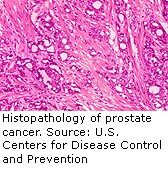
THURSDAY, June 30 (HealthDay News) — The cost of Provenge, an expensive and newly approved therapeutic prostate cancer vaccine, will be covered by Medicare for men with metastatic prostate cancer, the agency announced late Thursday.
The vaccine, made by the Dendreon Corp., costs $93,000 per patient and extends survival by about four months on average, according to results from clinical trials. A panel of experts convened by Medicare gave the nod for coverage last November, but the agency has only now announced it would cover the treatment.
“We are optimistic that innovative strategies may improve the experience of care for our beneficiaries who have cancer,” Dr. Donald M. Berwick, administrator of the Centers for Medicare & Medicaid Services (CMS), said in an agency news release. “CMS is dedicated to assuring that these patients can seek the treatments they need in accordance with their wishes.”
Research does suggest that the vaccine can extend the lives of men with cancer that has spread beyond the prostate. One study, published in July 2010 in the New England Journal of Medicine, found that the vaccine extended the lives of men with metastatic tumors resistant to standard hormonal treatment, compared with no treatment. And the therapy involved less toxicity than chemotherapy.
Provenge is a therapeutic (not preventive) vaccine made from the patient’s own white blood cells. Once removed from the patient, the cells are treated with the drug and placed back into the patient. These treated cells then trigger an immune response that in turn kills cancer cells, leaving normal cells unharmed. The vaccine is given intravenously in a three-dose schedule delivered in two-week intervals.
“The strategy of trying to harness the immune system to fight cancer has been something that people have tried to attain for many years; this is one such strategy,” study lead researcher Dr. Philip Kantoff, a professor of medicine at Harvard Medical School and a medical oncologist at the Dana-Farber Cancer Institute in Boston, told HealthDay last November.
Another expert said the therapy, while far from a cure, “looks promising.” Speaking at the time of the drug’s approval by the CMS panel, Dr. Elizabeth Kavaler, a urologist at Lenox Hill Hospital in New York City, said that “in this unfortunate category of [hormone-resistant] patient, we have very little to offer. Adding months to a man’s life is better than doing nothing, especially if the treatment involves minimal morbidity, as this vaccine promises.”
The U.S. Food and Drug Administration approved Provenge in April 2010 for the treatment of prostate cancer that has spread to other parts of the body and is resistant to standard hormone treatment.
In his team’s study, Kantoff’s group randomly assigned 512 men to receive Provenge or a placebo. All of the patients had advanced prostate cancer that had proven resistant to standard hormonal therapy.
On average, men receiving Provenge lived 4.1 months longer than men receiving a placebo, the researchers found. Average survival was 25.8 months for men in the Provenge group, compared with 21.7 months for men in the placebo group, meaning that Provenge extended survival by 22 to 25 percent, Kantoff said.
He contends that if the vaccine were used by men with less severe disease, survival might be extended even longer.
“Theoretically, if you take people with less disease and you stimulate the immune system, you could have a more profound effect, but we don’t really know that yet,” he said.
Compared with other treatments, such as chemotherapy, radiation and hormone therapy, Provenge has been touted as having fewer and less severe side effects. In this trial, the most common side effects were chills, fever and headache, the researchers noted.
Commenting on the high cost of Provenge, Kantoff said that “this is a treatment given over a four-week period, as opposed to other treatments that are given over many months, where the costs can be high as well, if not comparable to or more expensive [than Provenge].”
More information
For more information on prostate cancer, visit the American Cancer Society.

